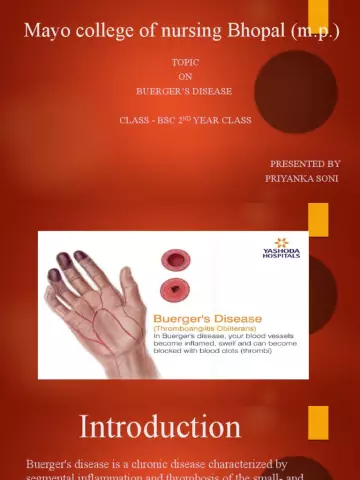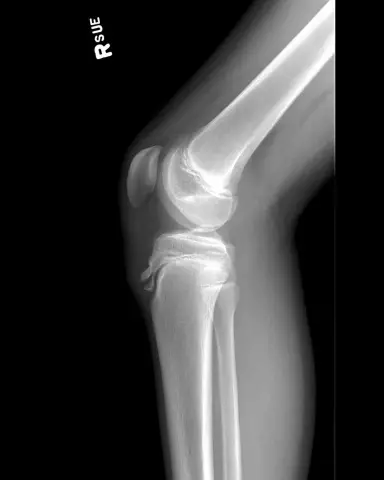- Author Rachel Wainwright wainwright@abchealthonline.com.
- Public 2023-12-15 07:39.
- Last modified 2025-11-02 20:14.
Alzheimer's disease

Alzheimer's disease was first described and studied in detail by the German psychiatrist Alois Alzheimer.
Alzheimer's disease is a common form of dementia that occurs in people over the age of 65.
The disease is characterized by the death of brain cells, the inability to create new neural connections, which seriously affects the patient's memory and intelligence, as well as his behavior and perception of the world around him.
Alzheimer's disease symptoms
The first symptoms of Alzheimer's disease can be noticed as early as 40 years old, but are there many people who will be alerted by them? Thus, the disease continues to progress, while symptoms may appear only occasionally: now appearing, then disappearing.
After 65 years, the disease makes itself felt, and the persistent symptoms of Alzheimer's disease become apparent, poisoning the life not only of the patient, but also of his family.
Each person has different primary symptoms of Alzheimer's disease. One person, casually glancing in the mirror, may not recognize himself in the first seconds. Another may have memory impairment or confusion between past and present. For these symptoms, neurologists determine the stage of Alzheimer's disease.
As a rule, in the first stage of Alzheimer's disease there are no significant changes in the person's consciousness and behavior. During a medical examination, profound memory impairments are not detected, and the person himself can only occasionally complain of apathy.
Symptoms of the second stage of Alzheimer's disease can be mistaken for ordinary age-related changes. This stage is characterized by minor impairments of memory and attention, distraction. An elderly person may forget the location of objects in the house. On medical examination, these violations are not detected.
In the third stage of Alzheimer's disease, a detailed physical examination reveals abnormalities in memory and attention. The patient begins to have difficulties in communication, due to the fact that some words are forgotten and replaced by others that are not suitable in meaning. Difficulties arise in the perception and memorization of new information; the patient is somewhat depressed and confused. Early stage Alzheimer's disease is usually diagnosed at this stage.
During a medical examination of a patient at the fourth stage of Alzheimer's disease, pronounced disorders are found. In society, the patient feels confusion, depression. He does not know how to act in a given situation, confuses events, is not able to plan his actions, manage finances.
The fifth stage of Alzheimer's disease is intermediate. Help is becoming more and more necessary to carry out elementary actions. For example, dress for the weather or button up all the buttons correctly. A medical examination reveals that the patient is no longer able to remember important details of his biography. Difficulties may arise with orientation in time and space.
In the sixth stage, Alzheimer's disease destroys the personality. The patient develops various manias, groundless suspicions and fears. There is also a desire for vagrancy. A depressive state with bouts of aggression and hallucinations is also observed. At this stage, the patient needs constant care and assistance, because even when using the toilet, he may have difficulties. He still remembers his name, but he hardly speaks, or only occasionally utters individual phrases and words.
The seventh stage is the last, extremely difficult. The patient cannot eat and use the toilet; urinary incontinence is common. He hardly speaks, does not smile and is no longer able to hold his head. He often lies, because he cannot walk and sit without assistance.
Causes of Alzheimer's Disease
Women are more prone to Alzheimer's disease than men. This is due to the fact that the characteristics of the life expectancy of men do not allow them to reach the age at which the disease appears.
It was believed that people with little education were susceptible to this disease. This is partly true because people with low IQs have weaker brain connections.
I must say that a low level of intelligence is not yet an indicator. An important role in the development of Alzheimer's disease is played by a hereditary factor that increases the risk of getting sick at times.
The main causes of Alzheimer's disease also include hypertension, diabetes and atherosclerosis. That is why it is important to prevent and treat these ailments in time, before they provoke something more terrible and serious.
Alzheimer's disease treatment
There are no drugs that can stop this disease yet. Treatment for Alzheimer's disease is directed only at relieving symptoms.
With frequent attacks of aggression, tranquilizers and anticonvulsants are usually used to reduce anxiety.
In order to take the patient out of a depressive state for a while, it is possible to use non-drug methods. It can be anything that causes positive emotions in the patient; everything he once loved. Favorite music, loved ones, pleasant aromas and even sunbathing - all this will stabilize the mood and ease the course of the disease.
Anxiety and hallucinations that are common in patients can be treated with antidepressants. It will be useful to protect the patient from fuss and trouble and offer him to keep a daily diary, which will compensate for the loss of memory in the early stages of Alzheimer's disease.
Prevention of Alzheimer's Disease

Today, about 30% of all elderly people over 65 are at risk, and over time, their number will increase 2-3 times. Therefore, now you need to ask yourself the question: what have I done in order not to be among the sick in my old age?
In the prevention of Alzheimer's disease, the omega-3 fatty acids found in salmon and other fatty fish have been shown to delay the onset of the disease and alleviate its course.
However, this ailment is mainly provoked not by malnutrition, but by mental "inactivity", a low level of intelligence. Playing chess, learning languages, mastering a new musical instrument - all this forces the brain to build new neural connections. This means that it increases the likelihood that Alzheimer's disease will not affect you and your loved ones.
YouTube video related to the article:
The information is generalized and provided for informational purposes only. At the first sign of illness, see your doctor. Self-medication is hazardous to health!






